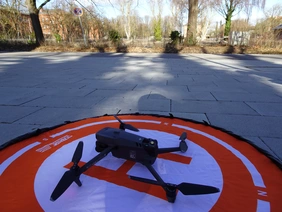Climate change is causing our cities to heat up, with sealed areas being particularly affected. The extent to which an urban space heats depends, among other things, on the building geometry, the thermal properties of the building fabric, the radiation properties of the surfaces, and the heat emissions caused by humans. This combination of physical processes, urban infrastructure, and its heat radiation is also known as the "urban heat island" effect.
As the infrastructure of universities often makes up a large part of the urban area, it has a significant impact on the overall urban climate. To develop a climate-resilient campus, a deeper understanding of the spatial complexity of the site and the risks is necessary. This is precisely what Lisa Lohse's drone flight contributes to.
This took place as part of the joint project WaNdel!4, which is looking at transformation pathways for sustainable universities. It is funded by the Federal Ministry of Education and Research with 342,845 euros as part of the FONA strategy, which is based on the United Nations' Agenda 2030.




![[Translate to English:] Logo Akkreditierungsrat: Systemakkreditiert](/fileadmin/_processed_/2/8/csm_AR-Siegel_Systemakkreditierung_bc4ea3377d.webp)








![[Translate to English:] Logo IHK Ausbildungsbetrieb 2023](/fileadmin/_processed_/6/0/csm_IHK_Ausbildungsbetrieb_digital_2023_6850f47537.webp)


